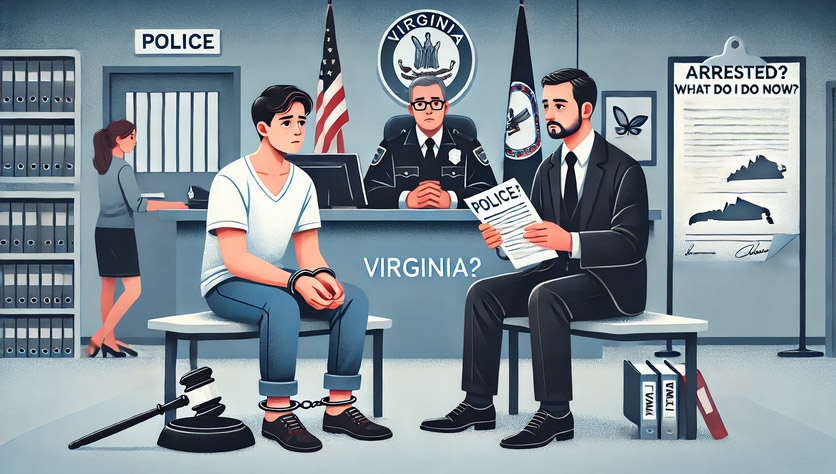Being arrested can be a frightening and overwhelming experience. Whether it’s your first encounter with the law or not, the immediate aftermath of an arrest in Virginia is critical. What you do—or don’t do—can significantly impact your case. As a seasoned criminal defense attorney, I want to guide you through the essential steps to take if you find yourself in this situation.
1. Stay Calm and Remain Silent
The first and most important thing to remember is to stay calm. While it’s natural to feel panicked or defensive, keeping your composure is crucial.
You have the right to remain silent under the Fifth Amendment. Exercise this right. You are not obligated to answer questions from law enforcement without an attorney present. Politely inform the officers that you wish to remain silent and want legal representation.
Anything you say can—and likely will—be used against you in court, so avoid discussing the details of your situation. Even casual comments can be misconstrued and harm your defense.
2. Do Not Resist Arrest
No matter how unjust or unnecessary you believe the arrest to be, do not resist. Resisting arrest can result in additional charges that will complicate your case. Stay cooperative, but remember you are not required to consent to searches or answer questions beyond basic identifying information.
3. Understand the Charges Against You
Once you’re arrested, the police should inform you of the charges you are facing. Take note of this information, as it will help your attorney develop a defense strategy. The charges may range from misdemeanors like public intoxication or trespassing to more serious felonies such as assault or drug possession.
If the charges seem unclear or overly broad, don’t panic. Your attorney will work to clarify and, if possible, challenge the charges later.
4. Do Not Consent to a Search Without a Warrant
If law enforcement asks to search your person, vehicle, or property, you have the right to refuse unless they have a warrant. Politely state that you do not consent to a search. If a search is conducted without proper legal authority, your attorney can challenge the admissibility of any evidence obtained.
5. Contact an Attorney Immediately
After your arrest, you should contact an experienced criminal defense attorney as soon as possible. Legal representation is critical to ensuring your rights are protected and your case is handled effectively. Your attorney will guide you through the process, help you understand the charges against you, and develop a strategy to achieve the best possible outcome.
If you cannot afford an attorney, request a public defender. However, if you can hire a private attorney, do so. A private defense lawyer often has more time and resources to dedicate to your case.
6. Be Aware of Your Rights at the Police Station
Once taken to the police station, you will likely be booked. This process involves recording your personal information, taking fingerprints, and possibly photographing you. You may be held in a cell or an interview room.
During this time, remember:
- Do not sign anything without your attorney’s advice.
- Do not discuss your case with anyone, including fellow detainees.
7. Consider Bail Options
In many cases, you will have the opportunity to post bail and be released while awaiting your court date. Bail is a monetary deposit meant to ensure that you appear in court. Depending on the severity of the charges and your criminal history, the court may set a bail amount or release you on your own recognizance (a promise to appear without payment).
If bail is set and you cannot afford it, your attorney may be able to request a reduction or help you connect with a bail bondsman.
8. Prepare for Your Court Appearance
After your release, you’ll be given a date to appear in court. This is when your case will officially begin. Ensure that you:
- Show up on time.
- Dress appropriately.
- Follow your attorney’s instructions regarding what to say and do in court.
Your attorney will handle much of the legal work, but your cooperation and attentiveness are essential.
9. Avoid Discussing Your Case Publicly
It’s tempting to talk about your situation with friends, family, or on social media, but doing so can backfire. Any statements you make, even informal ones, could be used as evidence against you. Discuss your case only with your attorney.
10. Focus on Moving Forward
Being arrested is a serious matter, but it’s not the end of the world. With the help of a knowledgeable criminal defense attorney, you can work toward a resolution that minimizes the impact on your life. This may include negotiating reduced charges, seeking alternative sentencing options, or fighting the case in court.
Final Thoughts
An arrest in Virginia can be a daunting experience, but taking the right steps can make all the difference. By staying calm, protecting your rights, and seeking skilled legal representation, you can navigate the process with confidence.
At the Tuomey Law Firm, we have nearly 25 years of experience helping clients in Fairfax, Loudoun, Prince William, and Arlington counties. If you’ve been arrested, contact us immediately for a consultation. We’re here to protect your rights and fight for your future.


